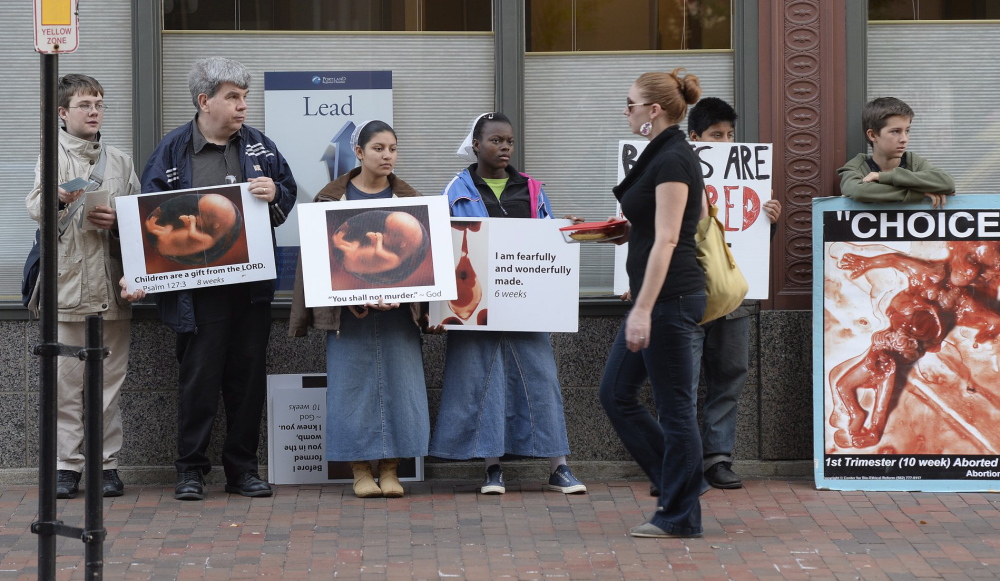Attorneys are headed to federal court Thursday to argue over a Portland city ordinance that establishes a buffer zone in front of a downtown abortion clinic, saying they will be closely watching a nearly identical case in Massachusetts that could soon be decided by the U.S. Supreme Court.
The ruling could influence the outcome of the Maine case currently pending in U.S. District Court in Portland – or even make the local case moot.
Anti-abortion activists are asking the court to temporarily suspend the 39-foot buffer zone around the entrance of the Planned Parenthood health clinic on Congress Street, which was approved by the Portland City Council last November.
A Shapleigh family, Daniel and Marguerite Fitzgerald and their children, claim that the buffer zone around the clinic violates the First and Fourth amendments of the U.S. Constitution, which protect free speech and prohibit unlawful search and seizure. They were joined in the case in March by another anti-abortion protester, Richmond resident Leslie Sneddon.
In their lawsuit, the Fitzgeralds and Sneddon name the city of Portland, Mayor Michael Brennan and each member of the City Council as defendants.
The city’s attorneys, Patricia McAllister and Danielle West-Chuhta, had sought to have the suit put on hold until the U.S. Supreme Court issues its ruling in the Massachusetts case, but the judge rejected their motion last month.
McAllister, however, said Wednesday that it’s “highly unlikely” the judge would suspend the city ordinance and does not expect Judge Nancy Torresen to rule immediately.
“All of the case law is in our favor, which is why the council passed the ordinance in the first place,” McAllister said. “Our ordinance mirrors, almost word for word, the ordinance that was approved in Massachusetts and upheld by the 1st Circuit (U.S. Court of Appeals).”
But McAllister said she can’t predict how the Supreme Court will rule in the Massachusetts case or exactly when it will rule.
The Supreme Court has 16 remaining cases to decide before its annual term ends in two weeks, including a Massachusetts case that asks whether the state can enforce a 35-foot buffer zone near the doors of abortion clinics or whether that violates the First Amendment rights of protesters hoping to persuade pregnant women from ending their pregnancies.
The high court heard oral arguments in the Massachusetts case, Eleanor McCullen v. Massachusetts Attorney General Martha Coakley, on Jan. 15, and has not announced when it will issue a ruling.
One of the attorneys representing the Fitzgeralds and Sneddon said on Wednesday that they expect the Supreme Court to overturn the Massachusetts buffer zone, thereby invalidating the Portland ordinance.
“If and when that happens, the Plaintiffs would move to have the City of Portland’s ordinance struck down consistent with that opinion,” said attorney Erin Elizabeth Mersino of Michigan, in an email while en route to Maine. “The Supreme Court’s decision in McCullen v. Coakley will be instructive for the Maine case, however it may not be determinative. The prohibited speech zone in the Maine case is even larger and even more intrusive on our Constitutional freedoms than the zone the Supreme Court is examining in McCullen v. Coakley.”
Mersino said that even if the Supreme Court issues its decision on Thursday morning in the Massachusetts case, Torresen would still need to decide whether to suspend the Portland ordinance.
“There was no need for this ordinance. The ordinance does not accomplish anything other than making the public sidewalk open to one class of people, while excluding another based upon the point of view of one’s speech. If you’re trying to counsel a patient of Planned Parenthood, then you are no longer welcome on the public sidewalk and you are subject to fines,” Mersino said. “That concept is un-American. All Americans regardless of viewpoint should be able to voice their viewpoint on the public sidewalk and in the public square.”
McAllister said that since the City Council approved the 39-foot buffer zone around Planned Parenthood, there have been no police enforcement issues and far fewer complaints.
“Things have quieted down tremendously since the ordinance has been in place. It has made a drastic difference over there,” she said.
For about a year before the Portland ordinance was enacted, 10 to 25 anti-abortion protesters, including children, have gathered regularly in front of Planned Parenthood’s entrance, some holding large signs with graphic photos of aborted fetuses. Some shouted Bible verses at women and called them murderers.
Soon after the protests started, Planned Parenthood hired police officers to ensure that the protests did not get out of control. The clinic also had volunteers in brightly colored vests help patients navigate the crowd.
Portland Police Chief Michael Sauschuck said in a sworn statement filed in federal court that although no one was cited for criminal or civil offenses during the protests, he supported the buffer zone ordinance.
“Just because certain behaviors might not rise to the level of criminal harassment, that does not mean a person having to transit a ‘gauntlet’ of protesters while entering the clinic might not legitimately feel harassed and intimidated,” he wrote.
Copy the Story LinkSend questions/comments to the editors.



Success. Please wait for the page to reload. If the page does not reload within 5 seconds, please refresh the page.
Enter your email and password to access comments.
Hi, to comment on stories you must . This profile is in addition to your subscription and website login.
Already have a commenting profile? .
Invalid username/password.
Please check your email to confirm and complete your registration.
Only subscribers are eligible to post comments. Please subscribe or login first for digital access. Here’s why.
Use the form below to reset your password. When you've submitted your account email, we will send an email with a reset code.